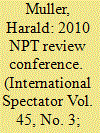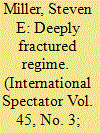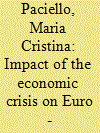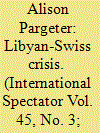| Srl | Item |
| 1 |
ID:
098799


|
|
|
|
|
| Publication |
2010.
|
| Summary/Abstract |
The eighth Review Conference of the Nuclear Non-Proliferation Treaty ended on 28 May with a consensus final document. A further deepening of the non-proliferation regime's crisis was thus avoided. The more cooperative policy of the Obama administration was one of the main reasons for this partial success which was assisted by the pragmatic negotiation posture of some moderate non-aligned states. However, the result is a compromise at the level of the lowest common denominator: the parties did not agree on bold steps towards nuclear disarmament, nor did they strengthen the toolbox for non-proliferation. In the end, the most outstanding result was the plan for a conference on ways and means to foster a Middle East nuclear weapon-free zone.
|
|
|
|
|
|
|
|
|
|
|
|
|
|
|
|
| 2 |
ID:
098800


|
|
|
|
|
| Publication |
2010.
|
| Summary/Abstract |
The United States had mixed results at the 2010 NPT Review Conference. On the one hand, it avoided the isolation and criticism directed at Washington in connection with the failed 2005 Review Conference, in large measure because the Obama administration took more congenial positions on a number of nuclear issues. Its cooperation also facilitated the successful achievement of a consensus final document. On the other hand, there was wide resistance to a number of measures for strengthening the NPT system favoured or promoted by the United States, resistance that reveals deep and worrying divisions within the regime.
|
|
|
|
|
|
|
|
|
|
|
|
|
|
|
|
| 3 |
ID:
098804


|
|
|
|
|
| Publication |
2010.
|
| Summary/Abstract |
With Algeria still self-excluded from the ENP, unconvinced by the UfM and indeed now seriously questioning the added value of the Association Agreement, EU-Algerian relations could not be at a lower point. Interaction within the EMP has conspicuously failed to lead to a meaningful convergence of the dyad's interests, even if it has encouraged a process of familiarisation of sorts between actors on both sides. Although energy has traditionally been the area where EU-Algerian relations are strongest, reflecting their market-rooted interdependence, it remains frustratingly under-institutionalised at the bilateral level. The conclusion of a 'strategic energy partnership' could help overcome the extant sterility of EU-Algerian relations, capturing the specificity of their shared interests and focusing minds on tailored 'enhanced bilateralism'.
|
|
|
|
|
|
|
|
|
|
|
|
|
|
|
|
| 4 |
ID:
098801


|
|
|
| 5 |
ID:
098803


|
|
|
|
|
| Publication |
2010.
|
| Summary/Abstract |
The ongoing global financial and economic crisis, which initially emerged in North America and Europe, has increasingly spread to emerging and developing countries, including the Southern Mediterranean. The global economic crisis could pose, and is posing, a number of challenges to Euro-Mediterranean relations. On the political front, it has contributed to further undermining the political reform agenda included in the Barcelona Process and the European Neighbourhood Policy. On the economic front, the crisis is jeopardising trade integration in the Euro-Mediterranean area and could slow down the pace of economic reforms supported by the European Union in Southern Mediterranean countries.
|
|
|
|
|
|
|
|
|
|
|
|
|
|
|
|
| 6 |
ID:
098807


|
|
|
|
|
| Publication |
2010.
|
| Summary/Abstract |
Italy and Libya have always enjoyed a special relationship based on reciprocal economic interests. The 2008 Friendship Treaty and the formal apologies for the colonial past have paved the road for more stable cooperation between the two countries in other sectors as well. Libya has started a gradual and prudent reform that, minimising the risks of destabilisation, is meant to attract foreign investments outside of the hydrocarbon sector in an attempt to diversify the economy. As its major political and economic partner, Italy is playing an important role in the Libyan transformation process.
|
|
|
|
|
|
|
|
|
|
|
|
|
|
|
|
| 7 |
ID:
098806


|
|
|
|
|
| Publication |
2010.
|
| Summary/Abstract |
Since July 2008 when one of Qadhafi's sons was arrested in Geneva, Libya has been engaged in a major stand-off with Switzerland. What began as a personalised affair soon escalated into a major diplomatic crisis with the Libyan leader going so far as to declare jihad against the Swiss. Yet whilst Libya's response to the arrest surprised many and prompted questions about whether the recently rehabilitated Libya had really changed its ways, this affair in fact demonstrates some of the constants of Libyan foreign policymaking since the revolution of 1969. These include the highly personalised nature of policymaking in the Libyan state and the use of foreign policy in the enduring quest for popular legitimacy.
|
|
|
|
|
|
|
|
|
|
|
|
|
|
|
|
| 8 |
ID:
098808


|
|
|
|
|
| Publication |
2010.
|
| Summary/Abstract |
There is considerable debate on why are sanctions imposed, but little agreement so far. While the only consensus is that sanctions are aimed at changing the behaviour of a target, in fact, international sanctions can also be imposed to constrain actors or send signals. Since the creation of the Union in 1992, the EU has imposed 21 autonomous restrictive measures that are difficult to understand and compare without the proper analytical tools. The application of a tripartite taxonomy of the purpose of sanctions to the cases of the EU sanctions on Belarus, Zimbabwe and Uzbekistan is used to illustrate the differences and to set guidelines for a better understanding of international sanctions.
|
|
|
|
|
|
|
|
|
|
|
|
|
|
|
|
| 9 |
ID:
098805


|
|
|
|
|
| Publication |
2010.
|
| Summary/Abstract |
Turkey is not 'drifting' towards the east. It is in search of a new place and a new identity, given the many changes that have taken place in the domestic and international contexts, particularly since the end of the Cold War. This complex process of transformation does not in itself challenge Turkey's Western orientation, but it certainly puts it to the test. It is time for the debate on Turkey's drift to be replaced by a more serious and fruitful one on the reasons why Turkey is still important for the EU and the West and what Europe and the West mean for and can offer contemporary Turkey.
|
|
|
|
|
|
|
|
|
|
|
|
|
|
|
|
| 10 |
ID:
098802


|
|
|
|
|
| Publication |
2010.
|
| Summary/Abstract |
Through a series of open-question interviews carried out with those responsible for the UfM file between late 2008 and early 2009, some undeniable and unanimously accepted merits were voiced. However, views from the southern shores of the Mediterranean appear to be multifaceted and not uniform with only one dominant common trait echoing in all interviews and shaping negative perceptions, namely, the weight the Arab-Israeli conflict exerts in hampering the initiative. While a Union of projects could address the architectural deficit that has prevented the Mediterranean from becoming a coherently functional economic space, high politics emerge, yet again, as an inescapable reality that demands prioritisation.
|
|
|
|
|
|
|
|
|
|
|
|
|
|
|
|